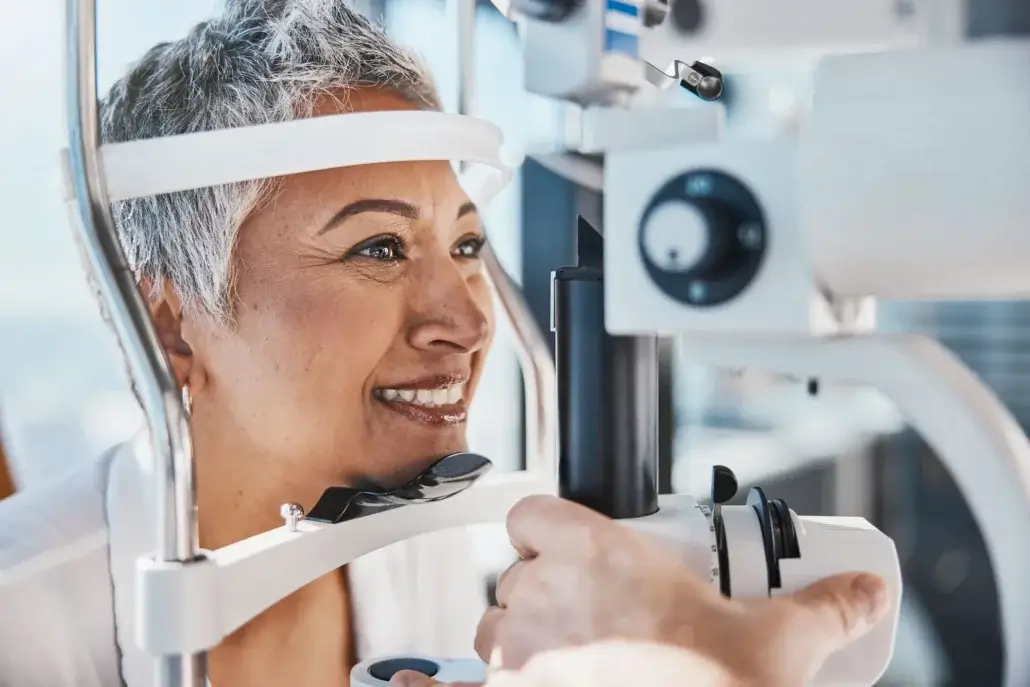See the Future More Clearly with the Right Vision Coverage
Living in Florida isn’t just about enjoying the sunshine; it’s about seeing life’s moments in vivid detail. At Peoples First Insurance, we’re here to ensure your vision care is as clear as our coastal waters. Whether you call Panama City, Tallahassee, or somewhere in between! Proper Florida vision insurance is your ally, safeguarding not only your sight but also your overall health.
Many overlook the importance of regular eye exams, but they’re as crucial as your annual physical. These exams can catch early signs of serious health issues like diabetes and hypertension, not to mention eye-specific conditions such as macular degeneration and glaucoma. With Peoples First Insurance, you’ll find coverage that keeps your eye health in check so you can focus on enjoying the Floridian lifestyle to the fullest.
Key Takeaways:
- Essential Coverage: Vision insurance in Florida typically covers eye exams, glasses, and contacts, helping you manage routine vision care costs.
- Plan Flexibility: Stand-alone plans or add-ons to existing health insurance are both viable routes to obtaining vision coverage.
- Exclusions to Note: Not all services, like LASIK, are covered, so it’s important to know what your plan includes and excludes.
- How to Get It: You can enroll in vision insurance individually or through group plans from employers or organizations.
- Beyond Eye Health: Regular eye exams can detect broader health issues, making vision insurance a key part of your health regimen.
- Cost-Effectiveness: While costs vary, the right vision insurance plan can offer substantial savings on eye care and eyewear.
Find the Right Florida Vision Insurance Plan
Navigating vision insurance options can be complex, but you don’t have to do it alone. Whether you’re exploring new coverage possibilities or seeking clarity on your current plan, Peoples First Insurance is here to help. Our experts will ensure you find a vision insurance solution that meets your needs and budget effortlessly.
What Does Vision Insurance Typically Cover in Florida?
Vision insurance is specifically designed to manage the costs associated with eye care, providing coverage that’s distinct from your regular health insurance. This type of policy typically steps in to make vision-related treatment and preventive care more accessible and affordable. Whether it’s for the annual eye exams that keep your prescription up to date, or the corrective eyewear and procedures that keep your world in focus, vision insurance is there to ease the financial burden.
- Eye Exams: Regular screenings keep your vision sharp and catch health issues early.
- Prescription Eyewear: Frames and lenses are covered, making it easier to sport the latest styles without the hefty price tag.
- Contact Lenses: For those who prefer contacts over glasses, vision insurance plans often contribute towards the cost.
- Lens Enhancements: Features like anti-scratch and UV protection coatings are typically included to prolong the life and function of your eyewear.
Keep in mind, the specifics of what is covered can vary depending on your particular plan, making it important to understand your policy’s details.
What Does Vision Insurance Not Cover?
While vision insurance is a valuable asset for your eye care routine, it’s just as important to be aware of what isn’t typically covered. Knowing these limits helps you manage expectations and plan for out-of-pocket costs.
- Cosmetic Options: Upgrades like premium eyewear brands or cosmetic tints on lenses might not be covered.
- Advanced Lens Treatments: Certain specialized lens treatments, such as progressive lenses, may require additional payment.
- Elective Surgery: Procedures like LASIK or cosmetic eyelid surgeries are usually not included in standard vision insurance plans.
- Non-Prescription Eyewear: Sunglasses or reading glasses without a prescription are generally excluded from coverage.
These exclusions highlight the need to thoroughly understand your vision insurance plan in Florida. It’s crucial to check the details of what your specific policy covers and what it does not, ensuring you’re fully informed about your coverage.
The Benefits of Vision Insurance
Vision insurance is more than just a policy—it’s a strategic investment in your health and financial well-being. It bridges the gap between the high costs of vision care and affordability, ensuring that routine check-ups and necessary eyewear don’t strain your budget.
What Could Vision Care Cost Without Insurance?
Without the cushion of insurance, the expenses for vision care can be surprisingly steep. An eye exam alone can cost over a hundred dollars, and that’s before adding the price of frames, lenses, or contact lenses—which can run into the hundreds or even thousands depending on the brands and materials chosen. And if you require specialized lenses or treatments for conditions such as astigmatism or presbyopia, the costs can escalate even further.
The financial benefits of having vision insurance become clear when you compare these potential out-of-pocket expenses with the manageable copays and discounted services that a good vision plan offers. It’s not just about savings, either—regular eye exams covered by insurance can detect early signs of eye disease and broader health issues, potentially saving on future medical costs and protecting your overall health.
How Does Vision Insurance Work?
Vision insurance is a straightforward way to manage your eye care costs. By paying a regular monthly premium, you gain coverage for services like eye exams and prescription eyewear. Here’s a quick breakdown:
- Regular Premiums: You pay a set amount each month to keep your vision coverage active.
- Deductibles and Copays: Before your plan pays out, you may need to meet a deductible, and you might have a copay at the time of service.
- Coinsurance: For some services, you may pay a percentage of the cost, while your insurance covers the rest.
- In-Network Providers: Using your plan’s network of eye doctors often maximizes your benefits, giving you the best rates for services.
Each plan has its own terms, so it’s important to understand the details of your coverage to make the most of your benefits.
How Much is Vision Insurance in Florida?
When it comes to the cost of vision insurance in Florida, there’s no one-size-fits-all answer. On average, individual vision insurance plans can range from a modest $5 to $15 per month. However, several factors can influence the final price of your policy:
- Plan Type: Comprehensive plans with lower deductibles and copays typically come with higher premiums.
- Coverage Level: The extent of coverage—whether it’s basic preventive care or includes allowances for frames and contacts—can affect cost.
- Provider Network: Plans with broader networks of doctors and optometrists might be priced higher.
- Location: Costs can vary by region, with metropolitan areas like Miami potentially being more expensive than smaller cities.
Understanding these factors and comparing different plans based on your specific needs is crucial to finding the right vision insurance at the right price in Florida.
How to Get the Right Vision Insurance Plan
Navigating through the myriad of vision insurance options can be overwhelming, but with Peoples First Insurance, you’re not alone. We’re here to guide you in selecting a plan that aligns with both your vision care needs and your budget. Follow these steps to clarity:
- Evaluate Your Vision Care Needs: Start by assessing how often you and your family need eye care, including check-ups, glasses, or contacts.
- Understand the Plans: We’ll help you compare the benefits and costs of each plan, taking into account copays, deductibles, and covered services.
- Set Your Budget: Decide what you’re comfortable spending on premiums and out-of-pocket costs to narrow down your choices.
- Get Expert Advice: Our specialists at Peoples First Insurance are adept at demystifying how vision insurance works and will provide personalized recommendations based on your needs.
- Make an Educated Choice: With our assistance, you’ll be able to select a vision insurance plan that offers the best value and coverage for your situation.
- Seamless Enrollment Support: Once you’ve made your decision, we’ll assist you with the enrollment process to ensure you can start utilizing your benefits as soon as possible.
At Peoples First Insurance, we don’t just connect you with any vision plan; we help you find the best fit through our network of trusted providers, ensuring you get quality coverage without the guesswork.
Expert Guidance on Vision Insurance in Florida
Peoples First Insurance is your steadfast ally in cutting through the complexities of vision insurance in Florida. We dedicate ourselves to finding you the best vision insurance plans, offering clear-cut advice and seamless support throughout your decision-making process. Our goal is to ensure you have the coverage you need to enjoy all the visual splendors of Florida life with the peace of mind that comes from knowing you’re well-protected.
For personalized guidance and to start seeing your insurance options more clearly, connect with Peoples First Insurance today.
FAQs
You can obtain vision insurance through several avenues: your employer may offer it as part of their benefits package, you can purchase it as an individual plan directly from a carrier. Peoples First Insurance specializes in helping you compare and select the best vision insurance plan to meet your needs.
Check with your employer’s human resources department if you’re unsure about your job benefits. Alternatively, review any insurance documentation you have, or contact your health insurance provider directly. If you’re still uncertain, Peoples First Insurance can assist in determining whether you currently have vision coverage and what benefits it includes.
Most vision insurance plans cover prescription glasses, including the lenses and frames. However, the amount of coverage for frames can vary by plan, and there might be a limit to how often you can update your frames.
Yes, insurance typically covers glasses frames, but there may be a cap on the amount the insurance will pay for them. This cap can range depending on your specific vision insurance plan.
Vision insurance plans usually cover contact lenses. Coverage might include a certain number of boxes of contacts per year or provide a fixed allowance towards the cost of your lenses.
Health insurance usually covers medical eye care, such as treating injuries or diseases affecting the eyes, but it often does not cover routine vision exams, glasses, or contacts. Vision insurance specifically provides coverage for routine eye care, including exams, glasses, and contacts.
Medical insurance may cover an eye exam if it’s related to a medical issue or condition, but it typically does not cover routine vision exams. For regular check-ups and screenings, you would need vision insurance.
The Affordable Care Act (Obamacare) includes pediatric vision coverage as one of the essential health benefits, but adult vision coverage is not a requirement. Some ACA marketplace plans may offer vision insurance as an additional benefit, or you can purchase stand-alone vision coverage off the Marketplace.
Vision insurance usually covers prescription sunglasses since they provide corrective vision support. Some plans may also offer discounts on non-prescription sunglasses from in-network providers. It’s best to check your individual policy for specifics regarding coverage and discounts for both prescription and non-prescription sunglasses.



